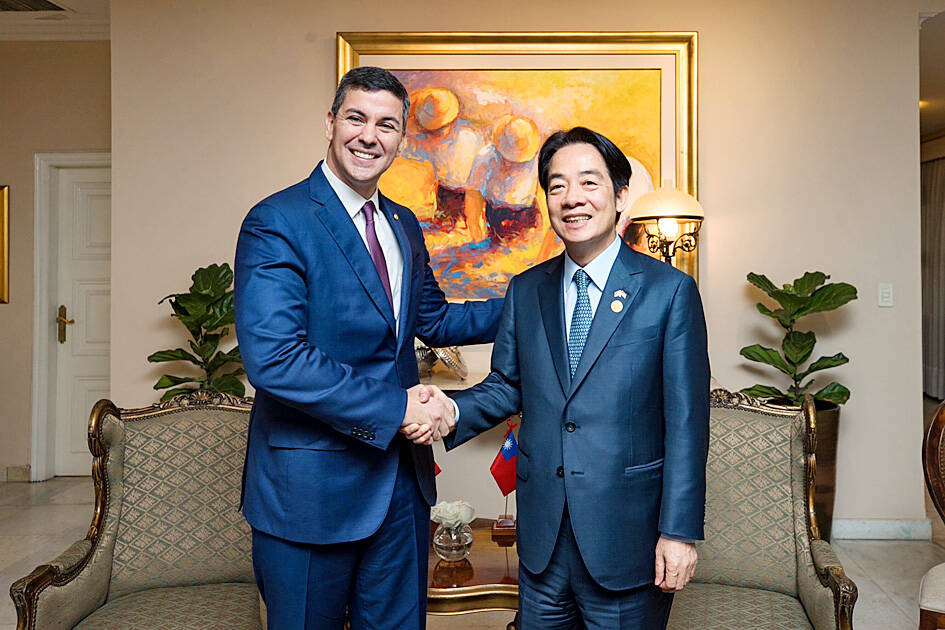Paraguayan President Santiago Pena has pledged to continue enhancing cooperation with Taiwan, as he and Japanese Prime Minister Fumio Kishida expressed opposition to any unilateral change to the “status quo” in the Taiwan Strait using force, Japanese media reported on Saturday.
Kishida yesterday completed a trip to France, Brazil and Paraguay, his first visit to South America since taking office in 2021.
After the Japanese leader and Pena spoke for more than an hour on Friday, exchanging views on the situation in East Asia in the face of China’s increasing military pressure on Taiwan, they affirmed that “unilateral attempts to change the status quo by force will not be tolerated,” the Yomiuri Shimbun reported.

Photo courtesy of the Presidential Office
Pena mentioned Taiwan during a joint news conference after their meeting.
“We have a long diplomatic relationship with Taiwan. We would like to continue to promote a wide-ranging cooperative partnership,” the Fuji News Network quoted Pena as saying.
The leaders agreed to work together to maintain and bolster a free and open international order, the Yomiuri Shimbun reported.
The importance of relations between Japan and Paraguay, which shares its values of freedom, democracy and the rule of law, is increasing as the international community faces a number of crises, the paper quoted Kishida as saying.
The Paraguayan president also reaffirmed robust ties with Taiwan during an interview with the Yomiuri Shimbun on Thursday, saying that the South American country’s stance on Taiwan is unwavering.
He also said that the firmer his country is on maintaining relations with Taiwan, the more pressure it receives from other countries to break those ties.
For example, Brazilian President Luiz Inacio Lula da Silva repeatedly suggested that Asuncion establish diplomatic relations with Beijing, he said.
During Paraguay’s presidential election last year, opposition candidates called for diplomatic ties with Taiwan to be severed, he said.
Some of the strongest opposition came from the domestic agricultural sector, as despite being a major exporter of soybeans and beef, Paraguay is unable to export beef to China and has to rely on third-party countries such as Argentina to export soybeans, he said.
Paraguay’s relationships with Japan and the US should serve as a backup force to help the country withstand pressure from home and abroad to switch recognition from Taipei to Beijing, Pena said.
“Supporting Paraguay is supporting Taiwan,” he added.
He said he hopes to prove that maintaining diplomatic relations with Taiwan is in the interest of his country, which can serve as an example for other countries to follow.

AIR SUPPORT: The Ministry of National Defense thanked the US for the delivery, adding that it was an indicator of the White House’s commitment to the Taiwan Relations Act Deputy Minister of National Defense Po Horng-huei (柏鴻輝) and Representative to the US Alexander Yui on Friday attended a delivery ceremony for the first of Taiwan’s long-awaited 66 F-16C/D Block 70 jets at a Lockheed Martin Corp factory in Greenville, South Carolina. “We are so proud to be the global home of the F-16 and to support Taiwan’s air defense capabilities,” US Representative William Timmons wrote on X, alongside a photograph of Taiwanese and US officials at the event. The F-16C/D Block 70 jets Taiwan ordered have the same capabilities as aircraft that had been upgraded to F-16Vs. The batch of Lockheed Martin

GRIDLOCK: The National Fire Agency’s Special Search and Rescue team is on standby to travel to the countries to help out with the rescue effort A powerful earthquake rocked Myanmar and neighboring Thailand yesterday, killing at least three people in Bangkok and burying dozens when a high-rise building under construction collapsed. Footage shared on social media from Myanmar’s second-largest city showed widespread destruction, raising fears that many were trapped under the rubble or killed. The magnitude 7.7 earthquake, with an epicenter near Mandalay in Myanmar, struck at midday and was followed by a strong magnitude 6.4 aftershock. The extent of death, injury and destruction — especially in Myanmar, which is embroiled in a civil war and where information is tightly controlled at the best of times —

China's military today said it began joint army, navy and rocket force exercises around Taiwan to "serve as a stern warning and powerful deterrent against Taiwanese independence," calling President William Lai (賴清德) a "parasite." The exercises come after Lai called Beijing a "foreign hostile force" last month. More than 10 Chinese military ships approached close to Taiwan's 24 nautical mile (44.4km) contiguous zone this morning and Taiwan sent its own warships to respond, two senior Taiwanese officials said. Taiwan has not yet detected any live fire by the Chinese military so far, one of the officials said. The drills took place after US Secretary

THUGGISH BEHAVIOR: Encouraging people to report independence supporters is another intimidation tactic that threatens cross-strait peace, the state department said China setting up an online system for reporting “Taiwanese independence” advocates is an “irresponsible and reprehensible” act, a US government spokesperson said on Friday. “China’s call for private individuals to report on alleged ‘persecution or suppression’ by supposed ‘Taiwan independence henchmen and accomplices’ is irresponsible and reprehensible,” an unnamed US Department of State spokesperson told the Central News Agency in an e-mail. The move is part of Beijing’s “intimidation campaign” against Taiwan and its supporters, and is “threatening free speech around the world, destabilizing the Indo-Pacific region, and deliberately eroding the cross-strait status quo,” the spokesperson said. The Chinese Communist Party’s “threats